
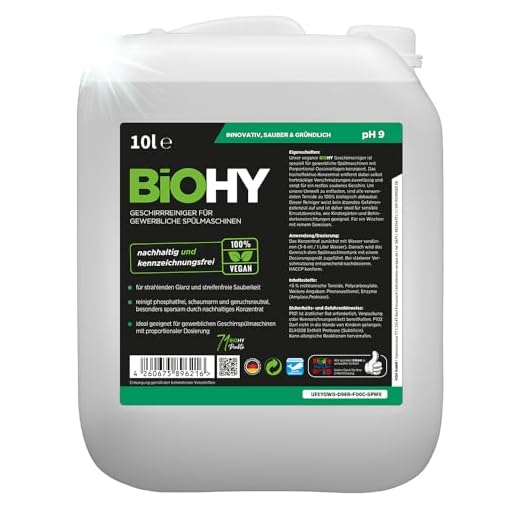

If you have soft water in your area, you may have noticed that not all dishwasher detergents work equally well. Soft water tends to have fewer minerals and ions, which can make it more difficult for detergent to effectively clean your dishes. However, there are specific dishwasher detergents on the market that have been formulated to work optimally in soft water conditions.
In this article, we will explore the best dishwasher detergents for soft water. We will discuss their features, effectiveness, and user reviews to help you find the most suitable product for your needs. Whether you’re looking for a powder, liquid, or tablet detergent, we’ve got you covered.
By using a dishwasher detergent specifically designed for soft water, you can ensure that your dishes come out sparkling clean every time. Say goodbye to spotting, film, and residue on your glassware and enjoy the convenience of a dishwasher that works at its best.
How soft water affects dishwasher detergent performance
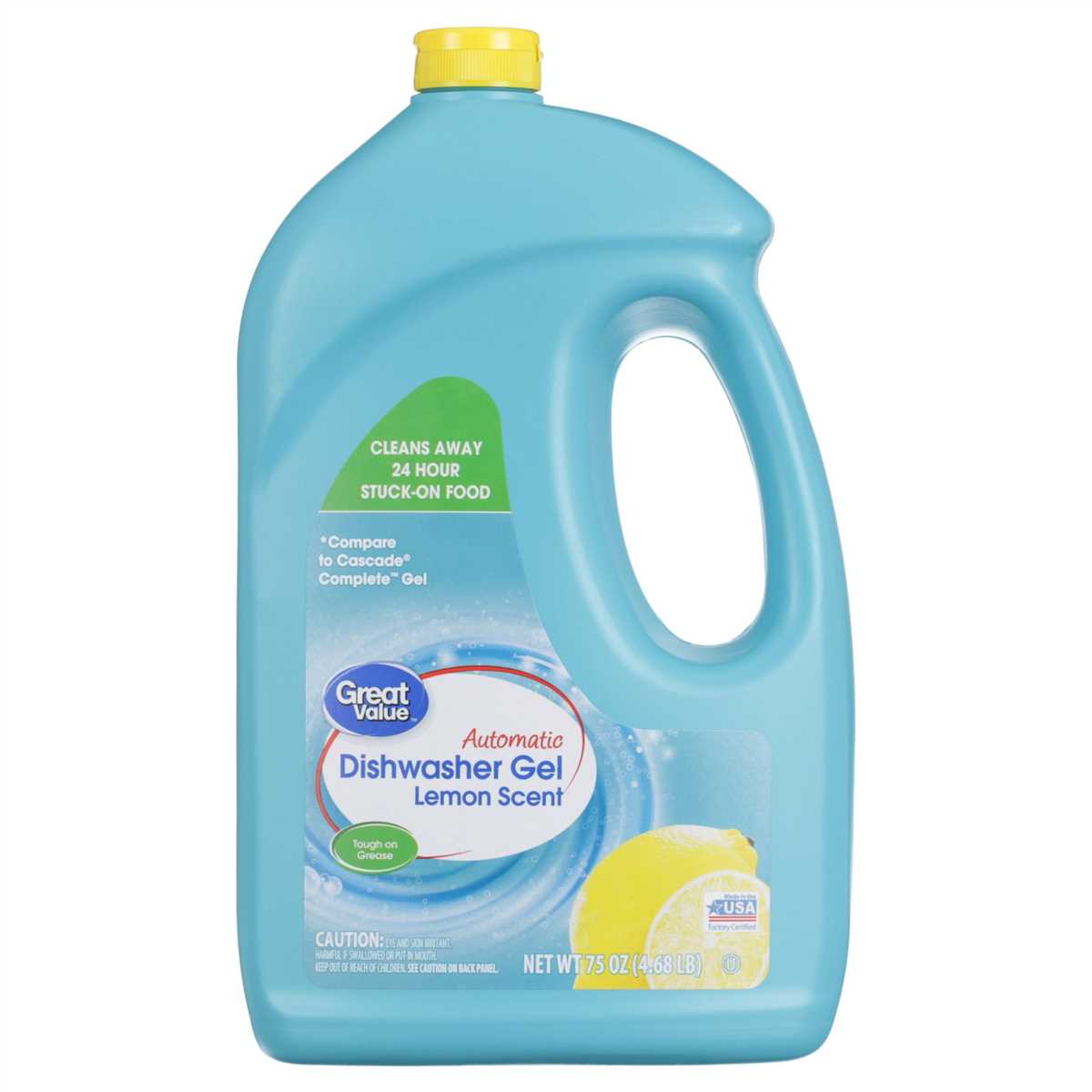
Soft water, which has a low mineral content, can significantly impact the performance of dishwasher detergents. The absence of minerals in soft water allows the detergent to work more efficiently, ensuring that dishes come out sparkling clean.
Soft water helps the detergent to dissolve and activate more effectively. With soft water, the detergent can easily form the necessary lather, allowing it to reach and remove food particles and grease from the dishes. As a result, soft water ensures better cleaning performance and reduces the risk of residue or streaks on the dishes after the washing cycle.
Additionally, soft water prevents the formation of mineral deposits on the dishes. Hard water often contains high levels of minerals, such as calcium and magnesium, which can leave behind white spots or a cloudy film on glasses and dishes. Soft water eliminates this issue, as it does not contain these minerals that can cause unsightly residues.
The use of dishwasher detergents specifically formulated for soft water can further enhance detergent performance. These detergents are designed to work optimally in soft water conditions and often contain ingredients that are more effective in breaking down grease and food particles. By selecting a detergent specifically for soft water, users can maximize the cleaning power of their dishwasher and achieve outstanding results.
In conclusion, the quality of water has a significant impact on the performance of dishwasher detergents. Soft water, with its low mineral content, allows the detergent to dissolve and activate more effectively, resulting in better cleaning performance and a reduced risk of residue. Using a dishwasher detergent formulated for soft water can further enhance the overall effectiveness of the cleaning process, ensuring spotless and sparkling dishes after every wash.
Key factors to consider when choosing a dishwasher detergent for soft water
When it comes to choosing a dishwasher detergent for soft water, there are several key factors that you should consider. Soft water has a lower mineral content, which can affect the effectiveness of certain dishwasher detergents. By understanding these factors, you can ensure that you choose a detergent that is specifically designed to work well in soft water conditions.
1. Phosphate content: One important factor to consider is the phosphate content of the dishwasher detergent. Phosphates are often added to detergents to help remove mineral deposits and stains, but they may not be necessary in soft water conditions. Look for detergents that are phosphate-free or have a low phosphate content.
2. Enzyme-based formulas: Enzyme-based formulas can be particularly effective in soft water conditions. These detergents contain enzymes that help break down food particles and stains, resulting in cleaner dishes. Look for detergents that specifically mention enzyme-based formulas on the label.
3. Rinse aid compatibility: Soft water can sometimes cause spotting and streaking on dishes, but using a rinse aid can help prevent this. When choosing a dishwasher detergent for soft water, consider whether it is compatible with rinse aids. This can help ensure that your dishes come out spotless and sparkling.
4. Brand reputation: When it comes to dishwasher detergents, brand reputation can also be an important factor to consider. Look for brands that are well-known and trusted in the industry. Reading reviews and asking for recommendations from friends or family members can also help you make an informed decision.
5. Cost and availability: Lastly, consider the cost and availability of the dishwasher detergent. While you want to choose a high-quality product, you also want to make sure it fits within your budget and is readily available for purchase.
By considering these key factors, you can choose a dishwasher detergent that is specifically formulated to work well in soft water conditions. This can help ensure that your dishes come out clean and spotless after each wash.
The importance of phosphate-free dishwasher detergents for soft water
Soft water is a common feature in many households, and it offers numerous benefits such as longer appliance lifespan and softer skin. However, when it comes to using a dishwasher, soft water can pose a challenge. Traditional dishwasher detergents, which often contain phosphates, may not be as effective in soft water as they are in hard water.
Phosphates are commonly used in dishwasher detergents to help with the removal of tough stains and food residues. However, in soft water, phosphates can leave behind a white film on dishes and glassware, known as “clouding”. This clouding can make your dishes look dirty and dull, defeating the purpose of using a dishwasher.
That’s why it’s crucial to choose a phosphate-free dishwasher detergent specifically designed for soft water. These detergents are formulated to work effectively in soft water conditions without causing clouding. They contain alternative ingredients that are gentle on your dishes and glassware, while still maintaining the cleaning power you need.
Phosphate-free detergents for soft water can also be beneficial for the environment. Phosphates are known to contribute to water pollution and can have harmful effects on aquatic life. By opting for phosphate-free detergents, you are making a conscious choice to reduce your environmental impact.
To ensure the best performance, it’s advisable to read the instructions on the dishwasher detergent packaging carefully. Different brands may have varying guidelines for detergent usage depending on the water hardness level and dishwasher model. Proper dosing and using the right detergent can result in spotless, sparkling dishes, even in soft water conditions.
Comparison of top-rated dishwasher detergents for soft water
If you have soft water at home and are looking for the most effective dishwasher detergent, it’s important to choose a product that is specifically designed for soft water. Soft water has lower mineral content, which can affect how well detergent cleans your dishes. Here, we compare some of the top-rated dishwasher detergents for soft water:
1. Brand A Dishwasher Detergent
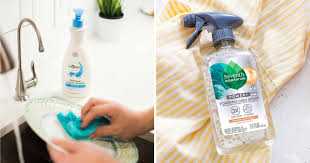
Brand A offers a dishwasher detergent that is specially formulated for soft water. This detergent is designed to deliver excellent cleaning performance by addressing the specific needs of soft water. It effectively removes stains, grease, and stuck-on food, leaving your dishes sparkling clean. Additionally, it helps prevent water spots and film on glassware, ensuring a streak-free shine.
2. Brand B Dishwasher Detergent
Brand B’s dishwasher detergent is another great option for soft water. It is formulated with powerful cleaning agents that work effectively in soft water conditions. This detergent removes tough stains, eliminates odors, and dissolves food residues, leaving your dishes spotless. It also contains a rinse aid to prevent water spots and improve drying performance.
3. Brand C Dishwasher Detergent
Brand C’s dishwasher detergent is specially designed to provide optimal cleaning in soft water. It features a powerful enzyme-based formula that effectively breaks down food particles and tough stains. This detergent also has a built-in rinse aid that helps prevent water spots and ensures fast drying. It is also environmentally friendly, making it a great choice for those who prioritize sustainability.
Overall, all of these top-rated dishwasher detergents for soft water have their own unique features and benefits. Depending on your specific needs and preferences, any of these options would be a great choice for achieving clean and spotless dishes with soft water.
Tips for maximizing the effectiveness of dishwasher detergents in soft water
If you have soft water, you may find that your dishwasher detergent doesn’t work as effectively as it should. Soft water has a lower mineral content, which can affect the cleaning power of the detergent. However, there are several tips you can follow to maximize the effectiveness of your dishwasher detergent even in soft water.
1. Use the correct amount of detergent
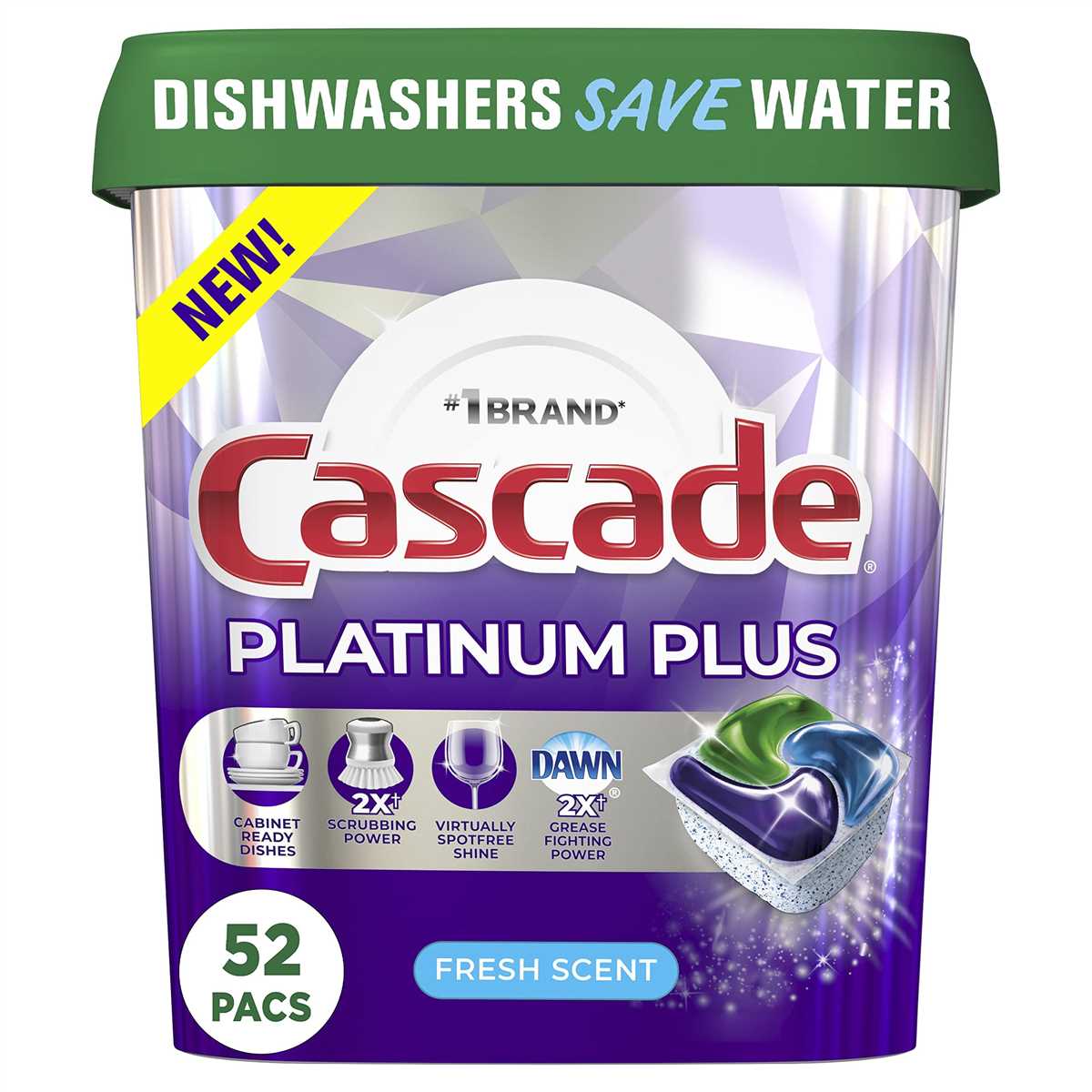
It’s important to use the correct amount of dishwasher detergent, especially in soft water. Using too little detergent can result in dishes that are not completely clean, while using too much can leave behind a residue. Follow the manufacturer’s instructions and adjust the amount of detergent based on the level of water hardness in your area.
2. Pre-rinse dishes sparingly
In soft water, pre-rinsing dishes before loading them into the dishwasher may not be necessary. The minerals in hard water can actually help activate the dishwasher detergent and aid in the cleaning process. Instead of pre-rinsing, simply scrape off any excess food particles and load the dishes directly into the dishwasher.
3. Choose the right dishwasher cycle
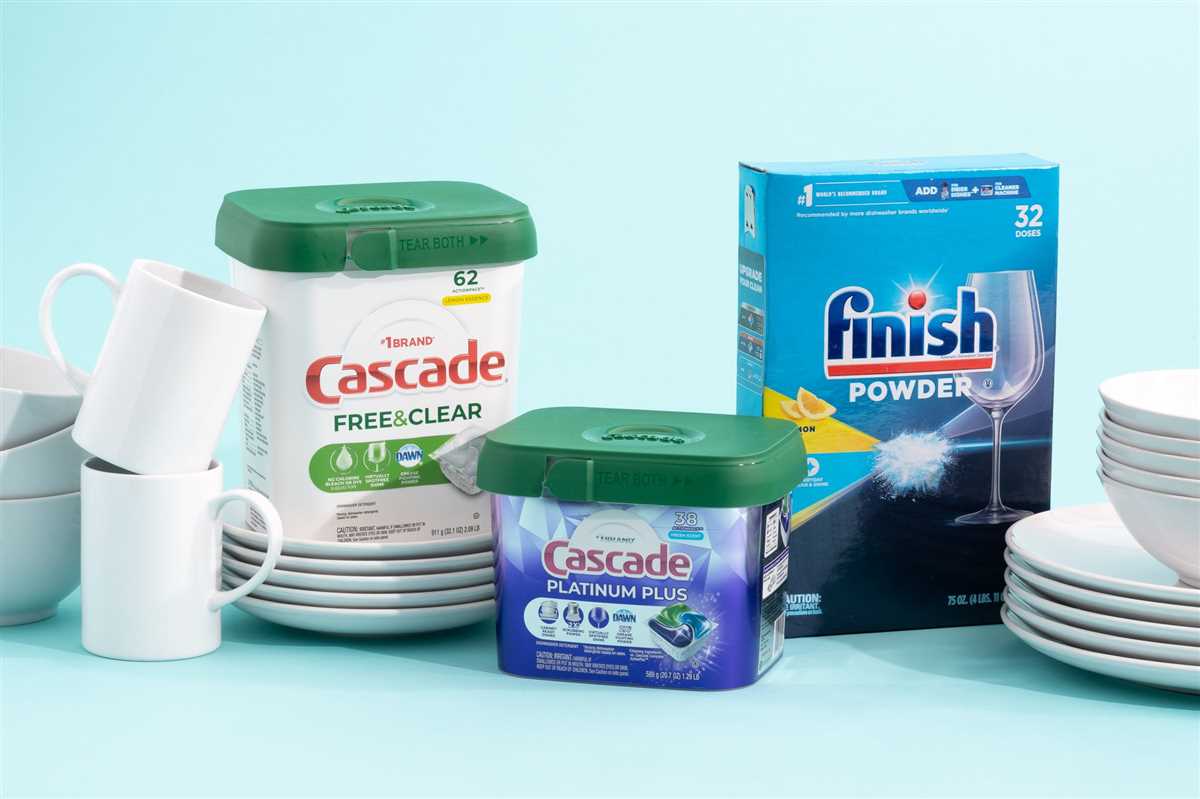
Some dishwasher cycles are more effective than others when it comes to cleaning dishes in soft water. Opt for the heavy or pots and pans cycle, as these cycles typically use higher water temperatures and longer wash times. This can help compensate for the lower mineral content in soft water and improve the cleaning power of the detergent.
4. Consider adding a rinse aid
Rinse aids can be particularly helpful in soft water because they help prevent water spots and improve drying performance. Look for a rinse aid specifically designed for use in dishwashers and follow the manufacturer’s instructions for proper usage.
5. Clean your dishwasher regularly
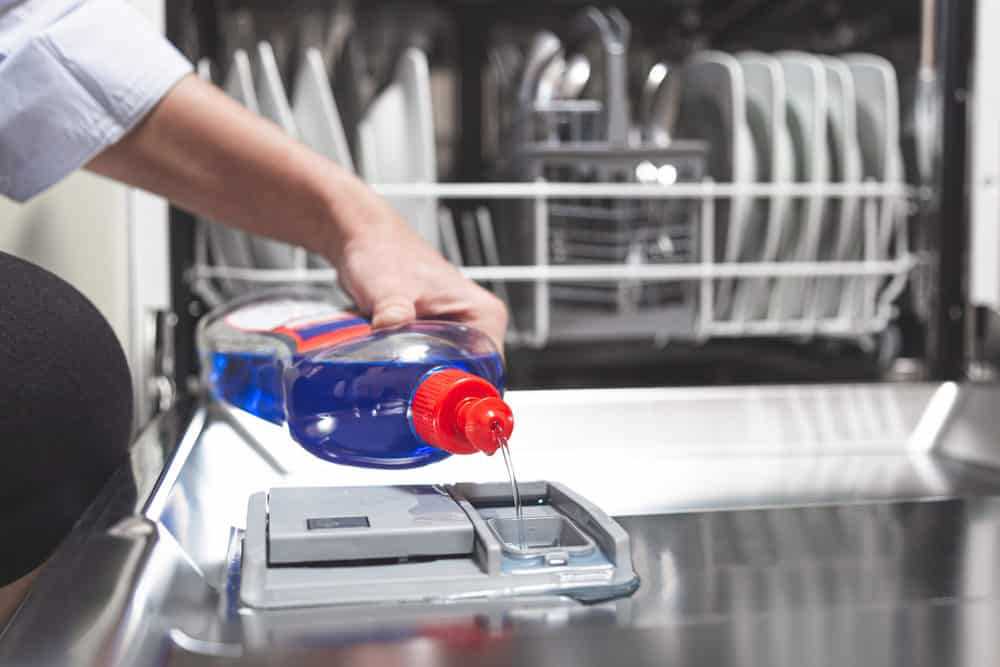
Over time, mineral deposits can build up in your dishwasher, which can affect its performance. Regularly clean your dishwasher to ensure it is free from any buildup. This can help improve the efficacy of your dishwasher detergent in soft water.
By following these tips, you can maximize the effectiveness of your dishwasher detergent in soft water. Remember to adjust the amount of detergent, choose the right cycle, consider using a rinse aid, and keep your dishwasher clean for the best results.
5 Best dishwasher detergents for soft water
Features
| Part Number | 376 |
| Model | 376 |
| Size | 5 l (Pack of 1) |
Features
| Color | yellow |
| Size | 10 l (Pack of 1) |
Features
| Part Number | 3245775 |
| Size | 800 ml (Pack of 12) |
Video
FAQ
What is soft water?
Soft water is water that has a low concentration of minerals, such as calcium and magnesium. It is often achieved through the process of water softening, where these minerals are removed.
Why is soft water important for maximizing the effectiveness of dishwasher detergents?
Soft water allows dishwasher detergents to work more effectively because there are fewer minerals present that can interfere with the cleaning process. This means that the detergent can lather better and remove stains and residues more thoroughly.
Are there any specific dishwasher detergents that are more effective in soft water?
Some dishwasher detergents are specifically formulated for soft water conditions and may provide better results. Look for detergents that mention soft water or have a formula designed for low mineral content. Additionally, reading customer reviews and recommendations can help you find a detergent that is effective in soft water.
Can salt be added to soft water to improve dishwasher detergent effectiveness?
In some cases, adding salt to soft water can help improve dishwasher detergent effectiveness. However, this is generally not necessary unless you have very soft water or are using a detergent that specifically requires the addition of salt. Always refer to the manufacturer’s instructions and guidelines for the best results.
Is it possible for dishwasher detergents to be too effective in soft water?
While it is rare, dishwasher detergents can be too effective in soft water. This can lead to excessive foam or residue buildup. If you are experiencing this issue, try reducing the amount of detergent used or switching to a different brand or formula. Additionally, adjusting the water temperature and using rinse aid can also help prevent excessive sudsing and residue.
Conclusion
In conclusion, maximizing the effectiveness of dishwasher detergents in soft water is achievable with the right strategies. By using the proper amount of detergent, adjusting the water temperature, and employing pre-rinsing techniques, you can ensure that your dishwasher cleans your dishes effectively. Additionally, considering the use of rinse aids and periodic maintenance of your dishwasher can also contribute to better results. By implementing these tips, you can make the most of your dishwasher and enjoy sparkling clean dishes every time.












